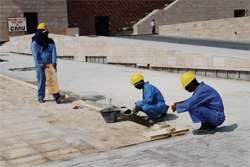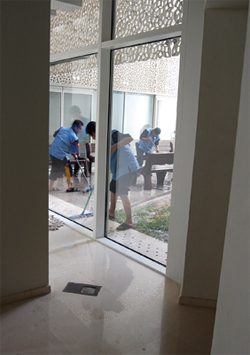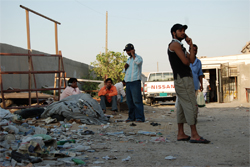Ramesh Sithamparapillai just wants to go home. The 23-year-old Sri Lankan has worked as a cleaner in Qatar since he was 18. He lives in a narrow room filled with a dozen cheap bunk beds and no mattresses. Fifteen other people share the room; three sleep on the floor. Thousands of rooms like this one fill Doha’s tall concrete slums, far removed from the Gulf city’s glittering metropolitan skyscrapers.
But Sithamparapillai can’t go home. The cleaning company he works for took his passport, and Qatar’s labor laws require foreign residents to obtain exit visas from their sponsors in order to leave the country.
Sithamparapillai and his friends said that there is frequently no running water in their building, but if they complain, their employers might cancel their visas and kick them out of the country. Although he needs his paycheck to take care of his mother, Ramesh would leave the country immediately if given the chance.
Doha is an economic boom town on the Qatar peninsula, which juts off of Saudi Arabia into the Persian Gulf. The constitutional monarchy’s royal family, the Al Thanis, dominate almost all aspects of Qatari life, particularly politics and business. Qatar Foundation, an organization funded by the government and headed by the Emir’s third wife, Sheika Moussa, heads the push for development in sectors other than oil and natural gas.
The Foundation’s most prominent venture is Education City, a compound of research and education buildings situated on over 2,500 acres on the outskirts of Doha. At the invitation of Qatar Foundation, the Georgetown School of Foreign Service was offered the opportunity to open a Doha campus (now known as SFS-Q), along with Carnegie Mellon University, Texas A&M, Virginia Commonwealth University, Cornell University’s medical school, and Northwestern University. Although Georgetown currently shares space with these institutions, it broke ground last week on its own building, becoming the fifth school to do so.
The country’s incredible economic expansion, financed largely by its position as the largest liquid natural gas exporter in the world, has resulted in a construction boom, requiring the labor of more workers than the country can support, many of whom live and work under extremely unpleasant, exploitative conditions.
Population statistics are unreliable, but ethnic Qataris are clearly a minority in the country, comprising only around 350,000 citizens out of an estimated population of 1,500,000, according to figures cited by Reardon-Anderson. The vast majority of non-citizens are Hindi- and Tamil-speaking migrant workers from South Asian countries like India and Nepal, who live in labor camps constructed by their companies.
The few stories of worker abuse that have been detailed in the local daily newspapers include torture, rape, and murder, typically resulting in minimal jail time for the offending Qatari national and deportation for the migrant worker victims. Foreign laborers take out loans in order to pay exorbitant placement fees to recruiting agencies in their home countries in order to find work in Doha, according to the U.S. State Department’s Report on Human Rights Practices. Labor laws offer little protection because of lax enforcement, while foreign embassies of developing countries do little besides offer refuge to their nationals, for fear of jeopardizing the flow of remittances workers send to their families back home.
“In my view, this is the number one political and moral issue in this country,” SFS-Q Dean James Reardon-Anderson said of the widespread exploitation of workers. Readon-Anderson said that one of Georgetown’s reasons for opening a Qatar campus is that SFS-Q can be a positive influence on the country’s development. Education City, along with the rest of Qatar, contracts outside companies that employ migrant workers for construction, security, maintenance, and cleaning. The buildings that house Georgetown’s SFS-Q are cleaned by workers like Sithamparapillai, who works for a cleaning company contracted to the Qatar Foundation.
Through construction policies, research, and service, members of the Georgetown community in Qatar are trying to effect change in Doha’s labor situation.
On October 30, Georgetown broke ground for its new campus building. The beginning of construction marks the establishment of an independent monitoring and compliance system to ensure a safe environment for those working on the site. Georgetown’s new building will be the first civilian building in the country to have quarterly safety audits by a contracted consulting firm, as well as an on-site supervisor to ensure compliance with safety regulations.
In his speech at last week’s groundbreaking for SFS-Q’s new building, Reardon-Anderson reiterated Georgetown and Qatar Foundation’s commitment “to the safety and welfare of workers on this site.” He added that the construction’s independent monitoring and compliance system might serve as a future model for safe construction in Education City, Qatar, and the wider Middle East.
Administrators from the other American universities that have built campuses in Qatar have relied on Qatar Foundation to monitor their workers’ safety.
“[Qatar Foundation] had the full authority. They have the contractor, they’re in charge, it’s their building,” Norma Haddad, the Public Affairs Officer for Texas A&M-Qatar, said. “As far as we’re concerned, we share the same ideas and values of worker safety, but the contracts are not with us, they’re with QF.”
Carnegie Mellon University’s Assistant Dean for Planning, Kevin Lamb, expressed similar sentiments. He said that Qatar Foundation told CMU officials that “it’s not [CMU’s] construction site, that we’re the end user, not a university partner.” As for the more specific issue of working conditions, Lamb said “We weren’t really pressing the issue. QF is an upright organization. they know worker issues.”
The labor situation touches everyone in Doha and across Qatar. Many residents employ drivers or maids, while the lack of accessible public transportation forces visitors to rely on taxis driven by migrant workers.
The United States Department of State ranks Qatar as a Tier 3 country for human trafficking, the lowest ranking and one that is indicative of serious human rights abuses. Although most media attention focuses on the particularly barbarous trafficking of child slaves for use as camel jockeys, abuse of the wider migrant worker class is endemic. Domestic workers are trained to expect routine beatings from their employers, according to the New York Times, while suspicious deaths of non-citizens are often not investigated, according to the 2007 Report on Human Rights Practices. Workers live packed into labor camps far outside the city, with no effective recourse against poor living or working conditions.
Workers arrive knowing about life in Doha from rumor and what recruiting agencies tell them, namely that Qatar will be “paradise,” in the words of a number of Education City security guards.
The air in the Industrial Area, where many of the workers live, is thick with dust and chemicals spewed from factories within yards of the workers’ camps. In stark contrast with slick downtown Doha, there are no street lights.
Upon entering the area, one first notices is the garbage, the debris of low-income consumer society scattered on the ground, covered in mud and lying by the side of the road. The attendant smell and flies are unsurprising, and clothes are hung out to dry on every exterior surface. But the workers and their rooms, no matter how crowded, are generally clean.
Ben Shaw (COL ’08), former Georgetown University Student Association President and current Student Affairs Officer at SFS-Q, followed buses from the construction site across from his apartment to a camp far outside the city.
“Everyone [in the camps] just looked like they had been beaten down,” Shaw said. “They all just looked exhausted with a pervasive sadness unlike any other place I’ve ever been.” After fourteen hour shifts doing construction work, he added, they are piled on top of one another and must wait in line to take a shower in the open, “without screens or anything.”
Visits to a number of camps within the Industrial Area confirmed that the camps vary widely in their quality, depending more on the largesse of the various employers than on the country’s labor laws. For the most part, however, the labor camps are a shocking sight, especially when contrasted with the prosperity of most Qatari citizens. Last year, Qatar had the highest per capita income in the world according to the Central Intelligence Agency’s World Factbook.
Beyond construction, the University finds other ways to engage with the problems of migrant workers. Professor Ganesh Seshan, who teaches economics at SFS-Q, has researched the socioeconomic status of the workers, looking at ways to maximize the benefits of their wages. Many migrants send their wages back to their families for years, then return home to find their meager funds exhausted-forcing them to come back to work again, perpetuating the harmful labor cycle.
With funding from Qatar Foundation, Seshan and his student assistants have surveyed workers in Doha and traveled to India to meet the families of the workers, attempting to better understand their needs-such as whether they would benefit from classes in financial literacy to learn how to save to start their own business or build a home.
“Most migrants have not thought that far, and instead focus on meeting daily needs and may not value the idea of savings,” Seshan said. The financial pressures on workers in Doha are enormous-some migrants occasionally commit suicide because they cannot meet the demands of their families back home, according to Seshan.
Seshan’s research project is not SFS-Q’s only attempt to address the problems facing migrant workers. A number of the most vibrant student activities focus on community service and outreach to workers, putting the school’s oft-heralded Jesuit values into practice.
Hope Club, led by Fay Al-Romaihi (SFS-Q `11) Bashayer Al-Ali (SFS-Q `11) and Ossob Mohamud (SFS-Q `11), focuses on community building through service to the workers. Club members often prepare and serve lunch to workers in Education City, and Hope has plans to host a student/worker cricket match and screen movies on Fridays. Al-Romaihi, Al-Ali, and Mohamud also lead the Hope donation drive, providing personal hygiene items to the same workers who keep Georgetown’s buildings clean and food to a group of Nepalese workers who have been abandoned by their sponsors, leaving them homeless.
Community service is not emphasized in Qatar’s public schools, according to Al-Ali, who never volunteered before coming to Georgetown.
“We’re trying to raise awareness of these issues outside of Education City,” she said.
Meanwhile, HELP, the Hoya English Learning Program, relies on student volunteers to teach English to the workers in Education City. Assma Al-Adawi (SFS-Q ’09) is one of the group’s three board members.
“No one really pays attention to the workers,” Al-Adawi said. “So if you give them one class a week it means the world to them. They do a lot for us, it’s only right to give back.”
Georgetown’s most visible workers are the security guards and custodians, and none would agree to be interviewed unless granted anonymity, for fear of losing their jobs. In general, the only workers willing to speak on the record either extolled their company or actively wished to be deported.
Education City’s workers have a lot to lose, with some of the best paying jobs and living conditions in Doha. The workers sweated profusely and trembled throughout interviews, afraid, as one worker said through a translator, that the “company will take action … if they hear I’m talking.” Another worker echoed his concern: “If we make a mistake, we get sent back.”
Workers’ financial problems are compounded by issues of pride. Workers frequently lie to their families about their living conditions, going so far as to save for staged studio portraits of themselves to send home and to minimize their hard work. The law limits working hours to eight a day–ten if paid overtime–but in reality the migrants work upwards of 80 hours a week. Some of the cleaning staff in Education City work two eight-hour shifts every day except Friday, for a total of 96 hours a week according to interviews with the workers.
Many workers do not even know the conditions of their employment since they were forced to sign contracts in a language they do not understand. In contract disputes, the Arabic version of the document is always regarded as superior to the translated version, according to the Report on Human Rights Practices. Misdirection because of a language barrier contributes to hiring scams that leave laborers working for lower wages than promised, according to Georgetown’s Service Learning Coordinator Uday Rosario, who is documenting the working conditions in Qatar.
Rosario’s documentation focuses on the actual cost of migration. A passionate advocate for worker benefits, Rosario hopes to help educate workers-some of whom may be illiterate-using unconventional methods, such as representative pictures.
Qatari law permits workers to form unions or go on strike, but such liberties are so heavily restricted that implementation of the law proves to be nearly impossible. As a result, according to both the Report on Human Rights Practices and the State Department’s 2008 Trafficking in Persons Report, there are no unions or legal strikes in Qatar; organizers of strikes are summarily deported.
“Collective bargaining, organizing, unions … that’s a dream!” Rosario said. “The workers come here with no information on the standard of living, no information on promised salary, where they are staying, quality of companies, no idea that they’re not allowed to go to the mall every Friday. ”
Rosario is referencing a new “Families Only” policy instituted recently in the most popular public places. In effect, workers are banned from the Souq (the old market), the Corniche (a waterfront esplanade), and most of Qatar’s malls, because the “Families Only” policy is scheduled on the workers’ typical day off, Friday. The ban became more explicit over the recent holidays, according to a July 28 article in the Gulf Times, one of the local daily English newspapers.
“It is a matter of the mall’s honour,” a security manager at the newest mall in Doha told the Peninsula on October 1. “We are not allowing people in from the Industrial Area … Groups of these people tend to create trouble.”
Exploitative recruiting scams abound, though it is unclear whether unfair hiring practices stem from the employers in Qatar because recruiting is subcontracted to manpower agencies in countries such as India. These agencies are unregulated and often outsource to subagents, which pay by the worker, according to Rosario.
The foreign workers may have limited legal support to protect their rights, but even when enacted, laws in the country are unevenly enforced, according to the Report on Human Rights Practices.
The problems remain unresolved because of the enormous benefits for the countries from which workers hail; the migrants give their most productive years for labor to the host country, while desperately poor nations become increasingly reliant on the remittances these workers send home to their families.
Rosario suggests eliminating the sponsorship law and forcing employers to pay market wages, so that the “onus is on companies to keep good workers. Now, they stay because they cannot leave.”
In the larger picture of labor migration, the role of recruiters in countries like India and Nepal must also be considered. Workers take out loans to pay exorbitant placement fees, taking months if not years to pay them back. According to Rosario’s documentation and confirmed by the Report on Human Rights Practices, some workers arrive in Qatar to find that their job does not exist, leaving them vulnerable to human trafficking.
The construction of Georgetown’s new building represents both a problem and an opportunity, which Reardon-Anderson and the building committee used to press the implementation of a safety standard only otherwise present in oil and gas construction.
“It’s part of being Georgetown to make the world a better place,” Anderson said at the groundbreaking ceremony. Although this is a step in the right direction to improve migrant labor conditions in Qatar, Anderson made “no pretensions to sweeping impact,” acknowledging that, when facing the enormity of the problem, the University is a relatively small player. Much is beyond Georgetown’s control, left up to the outside companies contracted by Qatar Foundation for construction.
“Clearly there are things that we can do that relate to worker safety to help regulate and enforce on the work site,” Dean Reardon-Anderson said. “We can really be effective if we insist on worker safety, and also get our partners to understand and hopefully implement this in the future.”
No workers attended the ceremony, except for the waiters that served guests and the catered reception following the event.











Interesting article, J. D. It’s too bad Georgetown can’t also somehow improve the workers’ living conditions, perhaps provide their own housing facilities. It may just take one of the colleges to start the process…
Excellent article – nice to see somone outside Qatar actually care. One point though – to be fair, Qatar has outlawed camel jockeys, now polices the camel racing and has returned the young boys home. Otherwise this is spot on – you could also mention that one mall, Hyatt Plaza, has refused to let in “smelly and badly dressed bachelors”!
The article points out the role that debt plays in keeping workers under control. Prof Seshean says lessons in ‘financial literacy’ are a valuable tool to let workers understand and then perhaps control their circumstances. The cynical mind draws a parallel to American students and asks where do they learn their financial literacy? From a university that cooperates with banks on student loans and credit cards?